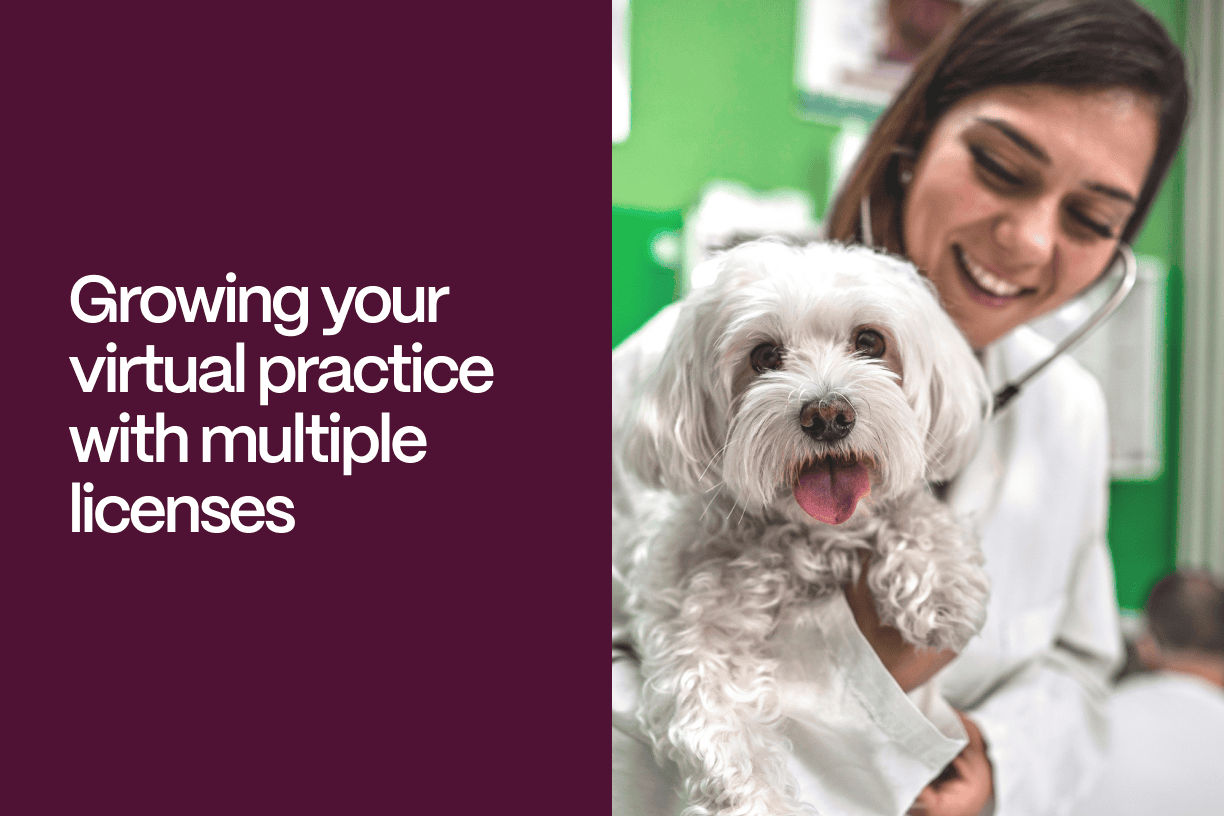Growing your virtual practice with multiple licenses

One of the advantages of virtual practice is the way it expands your reach. Vetster’s marketplace connects you to pet owners across your region and even across the globe. The veterinary telehealth landscape is rapidly changing and potential clients are looking for services like yours from a variety of locations. Obtaining licenses from multiple jurisdictions can have a huge impact on the growth of your virtual practice.
The idea of obtaining multiple licenses is not new or unique to virtual care. Relief/locum veterinarians have been utilizing this strategy for a long time to increase their options for work locations. They’ve also developed resources to help veterinarians learn what the different licensing requirements are. In many cases, reciprocity and endorsement agreements make it easy to apply for licenses from additional states or provinces. The regulatory agencies for each state or province dictates specific licensure requirements, and these details are available online for each jurisdiction.
For US veterinarians
The first step for obtaining multiple veterinary licenses in the US is deciding which other state(s) you want to be licensed in. Many factors come into play for making this decision, but if your goal is to grow your virtual practice as simply as possible, it’s best to look at:
- States that offer licensure by endorsement or have reciprocity agreements with the state where you’re currently licensed.
- States that have more progressive and open veterinary telemedicine laws.
- States where there is known veterinary shortages.
Fortunately, all of this information is easy to find.
Licensing requirements
You can find information about licensing requirements directly from each state’s regulatory board. In most cases you can also complete the application online. The veterinary locum resource Relief Rover has compiled this list of licensing requirements across the US so you can read them all in one place.
Some states keep it simple by offering a licensure by endorsement option for veterinarians who are already licensed in other states. This allows you to obtain a license in a new state by providing proof of your current license, education, and other required documentation without having to retake the national exam. Obtaining a license by endorsement can be as simple as completing an application, providing proof of licensure, and paying the fee.
Keep in mind that some states may have additional requirements. Passing state-specific boards or jurisprudence exams that assess your knowledge of the state’s laws and regulations may be required. Some states require additional processes like submitting fingerprints, undergoing a background check, completing specific CE hours, or providing proof of professional liability insurance.
The process of obtaining licenses in multiple states can be simple and quick thanks to easy access to the information you need. Review each state’s requirements and follow their guidelines to ensure a smooth and successful process. You may also consider joining statewide professional associations to keep abreast of the veterinary landscape in different states.
Telemedicine regulations
While the veterinary regulator board or licensure entity within each state is responsible for enforcing regulations, you need to look at each state’s practice act or similar legislation to review those regulations for yourself. The Virtual Veterinary Care Association (VVCA) is a great advocate in the telehealth space, and joining them is very worthwhile. They maintain excellent resources for keeping track of regulations affecting veterinary telemedicine, including an interactive map showing telemedicine laws in each state. The virtual care landscape is rapidly evolving, so it’s helpful to have easy access to the regulations across the US consolidated in one website. Veterinarians using the Vetster platform are encouraged to maintain a current understanding of the regulations in all jurisdictions where they are licensed, and to seek legal advice for any questions about interpreting the law.
There are also resources available describing the process for how US-licensed veterinarians can apply for licenses in Canadian provinces.
For Canadian veterinarians
The legislative authority to regulate the practice of veterinary medicine in Canada is a provincial responsibility. Each province has a licensing body established by statute, with licensing being the responsibility of a provincial veterinary association or a separate licensing body empowered by provincial legislation.
Specific requirements for veterinary licensure differ from province to province, so it is necessary to correspond directly with the registrar of the licensing body of the province in which you wish to practice. Contact information and websites for the licensing bodies in each province can be found on this Canadian Veterinary Medical Association webpage.
The College of Veterinarians of Ontario (CVO) has this step-by-step guide for how veterinarians licensed in other Canadian provinces can obtain an Ontario license. This can be very advantageous as Ontario is very forward-thinking with its approach to telehealth. Ontario also makes it clear that you do not have to give up your license from another province or territory to be approved for an Ontario license. Agreements between Canadian provinces and territories allow some veterinarians to apply for an Ontario license without additional training or examinations. Obtaining an Ontario license can be as simple as:
- Completing the application
- Providing a copy of your degree in veterinary medicine and National Board Exam results
- Passing the CVO Jurisprudence Exam
- Providing a letter of standing from your current jurisdiction and from any other jurisdiction where you held or currently hold a license
For everyone else
Information for veterinarians from other countries (including Canada) seeking licensure in the US can be found here through this AVMA resource.
Keeping it all organized
As your wallet of veterinary licenses expands, be sure to update your Vetster profile accordingly. Listing multiple licenses in your profile greatly increases your reach and helps pet owners in more locations find you. This in turn allows for exponential growth in your virtual practice.
It only takes a little bit of organization to maintain multiple licenses and a variety of tech tools are available to assist with that. You’ll want to focus on:
- Tracking your continuing education (CE)
- Staying on top of license renewal periods
- Keeping abreast of rapidly evolving telemedicine regulations
Tracking your continuing education
When registering for CE, look for opportunities to fulfill CE requirements across multiple jurisdictions simultaneously. Attend conferences, webinars, and workshops that are recognized by multiple licensing bodies to streamline the process. The American Association of State Veterinary Boards (AASVB) provides this tool for recording completed CE in one centralized location as well as other helpful license renewal information.
Staying on top of licensing renewal periods
Licensing periods vary from state to state, so you may find it helpful to use digital calendars to set up reminders for license renewal dates and CE requirements well in advance of the deadline to allow sufficient time for completion. Creating a centralized digital folder for storing copies of all licenses and CE certificates is helpful for ensuring easy access to this information and also prevents documents from getting lost or misplaced. A spreadsheet can be a highly effective tool for keeping track of:
- Each license
- Renewal dates
- Renewal fees
- CE requirements
- Tracking completed CE hours and topics
- Any other necessary supporting documents
- Links to renewal information and applications
Taking advantage of online license renewal systems/portals is another great way to save time.
Keeping abreast of rapidly evolving telemedicine regulations
Consider joining the VVCA and state/provincial veterinary associations to stay informed about regulatory changes. This also provides an opportunity for networking and sharing information with other veterinarians who hold licenses in multiple jurisdictions. Your peers may have valuable insight about specific state requirements and how they stay organized.
Implementing tips like these and establishing good systems for tracking and renewal simplifies the process and makes it easier to effectively manage your licenses across different states.
Looking to join Vetster?
You may create an account as a veterinary professional, or learn more here.



